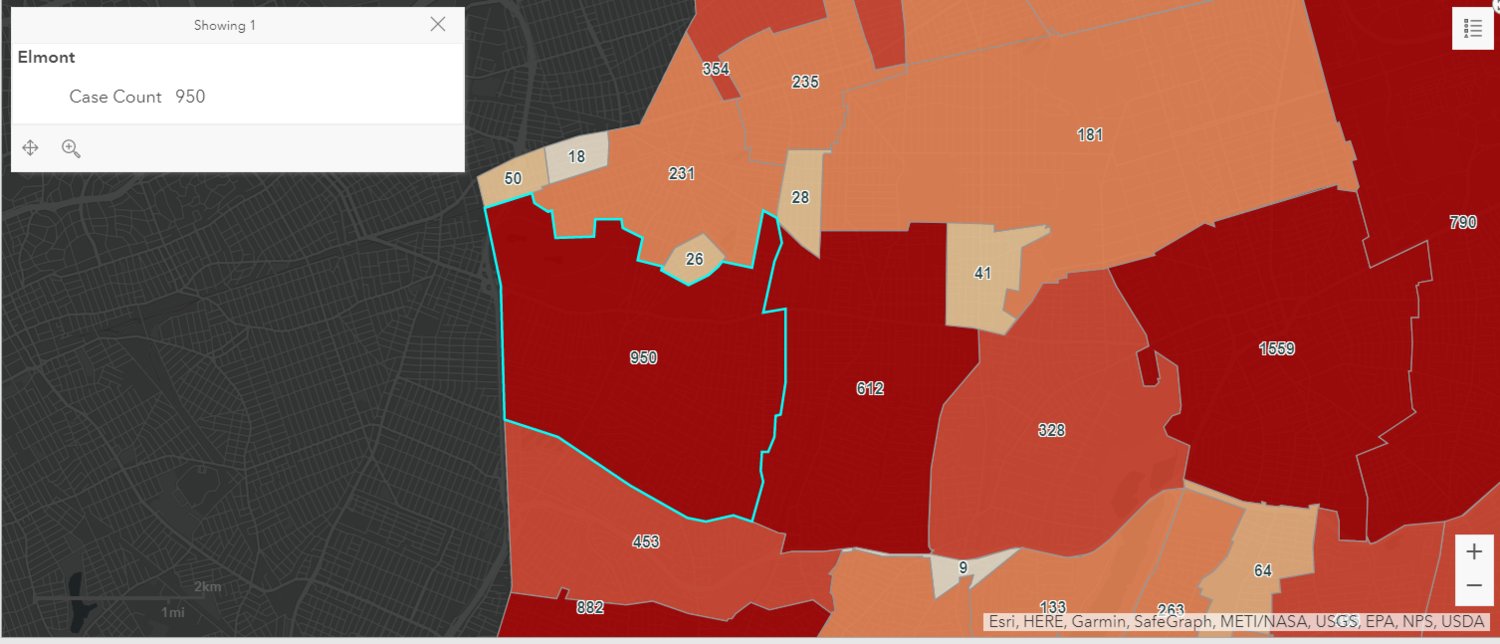Elmont remains one of the hardest-hit communities by the coronavirus
Elmont remains one of Nassau County’s hardest-hit communities by the coronavirus — even as the number of confirmed cases in the state begins to decline — with 1,016 cases as of last Saturday, according to data from the Nassau County Department of Health. Only Hempstead, Valley Stream and Freeport had more cases.
Franklin Square, meanwhile, had the 10th-highest number of cases, with 643 as of last Saturday, behind Uniondale, Levittown, Hicksville, East Meadow and Glen Cove.
Statewide, there were more than 288,000 positive Covid-19 cases as of Saturday, with 34,522 confirmed cases in Nassau County since the outbreak began.
The figures correlate with state data that shows the coronavirus is disproportionately affecting African-Americans and Latinos. The state released a study of 3,000 random New Yorkers last week that showed the infection rate among African-Americans and Latinos averaged 23 percent. For Asian-Americans, however, the rate averaged 11.7 percent, and for whites it averaged about 9 percent.
Elmont’s population is 45.5 percent black, 21.4 percent Latino and 14.8 percent white, according to Data USA, while Franklin Square’s population is 60.7 percent white, 20.4 percent Latino and 13.1 percent Asian-American.
Additionally, State Department of Health Data released earlier this month showed the fatality rate among African-Americans was 17 percent statewide, despite the fact that blacks making up only 9 percent of the state’s population. And in Nassau County, blacks, who represent 13 percent of the population, made up another 17 percent of the county’s fatalities.
As a result, Nassau County Legislator Carrié Solages and State Assemblywoman Michaelle Solages urged Gov. Andrew Cuomo to set up more rapid testing sites in communities with large minority populations, such as Elmont, Valley Stream, Freeport and Inwood. These communities were facing a backlog in testing at the time, Carrié wrote in a letter to the governor on April 8, “leaving many unable to receive the test in a timely fashion, and therefore forcing them to remain uncertain about their health status.”
He also noted that African-Americans are more likely to have underlying health conditions that can make Covid-19 more severe — such as heart disease, diabetes and hypertension.
Nassau County Executive Laura Curran has since opened new outdoor testing facilities in Hempstead and Freeport, and is expected to open a third in Elmont this week. These areas have large minority populations, and the sites will allow medical professionals to test hundreds of patients a day, regardless of insurance, immigration status or their ability to pay.
“While this service is available to everyone, we are striving to increase health care access and Covid-19 testing directly to communities where fatality from this terrible disease is more likely to occur,” Curran said in a statement. “We are one Nassau; we help whenever a community is in need.”
But there are signs that the rate of infection is starting to slow in New York. On April 24, deaths in the state fell to 422, the lowest number since the beginning of the month, and Cuomo announced that day, the three-day average of the number of patients in hospitals had fallen 11 days in a row, with the number of patients on ventilators declining for 12 days in a row. By Monday, the number of deaths had fallen below 400.
Still, he issued an executive order allowing pharmacies to test for Covid-19, and urged people to continue social distancing and practicing sound hygiene.
He described the pandemic at an April 19 news conference “as a mountain that just kept building and building and building,” and noted he had “no idea where the top of the mountain was.”
“We pray to God,” he said, that the infection rate “remains down on the other side” of the mountain.
But, he noted, “We still have a long way to go.”
Scott Brinton contributed to this story.

 41.0°,
Fair
41.0°,
Fair 




